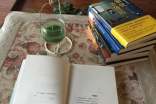祝福老师的英语句子怎么写(一)
杨浦新王牌教育 祝GF老师高三英语 第11讲 状语从句 状语从句2:
◆◆ 条件状语从句
1. If 表示正面的条件,unless 表示反面的条件,unless =if … not
If you are not too tied, let's go out for a walk.
You will be late ___ you leave immediately.
A. unless B. until C. if D. or
◆可与含有if 条件状语从句的复合句进行转换的两个句型:
祈使句+and/or+简单句; 分词+简单句
Think hard and you’ll have a good idea.
Thinking hard, you’ll have a good idea.
→ If you think hard, you’ll have a good idea.
Work even harder, or you will never pass the exam.
= If you don’t work harder, you will never pass the exam.
◆If 可以引导虚拟条件句,其他连词不可以
If I were you, I would study hard.
◆If only “要是……就好了/该有多好啊”引导的从句谓语必须用虚拟语气
If only I were a millionaire!
If only I hadn't lied to her yesterday!
2. as/so long as 意为“只要” once 一旦
As long as you are not afraid of difficulties, you are sure to succeed.
As long as you don' t lose heart, you will succeed.
3. supposing that = suppose that 表假设
4. Provided (that)= Providing (that) “如果,只要”
5. on condition that “以……为条件”
6. Given that “倘若考虑到……”
典型例题:
1、The WTO cannot live up to its name ____ it does not include a country that is home to one fifth of mankind. (2000全国)
A.as long as B.while C.if D.even though
2、It is known to all that _____ you exercise regularly, you won’t keep good health. (05重庆卷)
A. unless B. whenever C. although D. if
3、_____ I can see, there is only one possible way to keep away from the danger. (04北京春季)
A. As long as B. As far as C. Just as D. Even if
◆◆ 地点状语从句
地点状语从句通常由where, wherever 引导。
Where(= in/on/ to/at the place where) 表特定的地点;
wherever (= in/on/ to/at any place where)表非特定的地点,可引导地点状语从句也可引导让步状语从句。例如:
Put it where you can see it.
Where there is a will, there is a way. 有志者,事竟成。
Where I live there are plenty of trees. 我住的地方树很多。
Remember you are a Chinese wherever you go. 记住你是中国人,不论你到哪里。
Wherever they went, they received a warm welcome. 无论他们走到哪儿都受到热烈欢迎。 Wherever I am, I will be thinking of you. 不管我在哪里我都会想到你。
注意:不要把where 引导的状语从句和where 引导的定语从句相混淆。
We shall go where we are most needed.
We shall go to the place where we are most needed.
◆◆ 原因状语从句
because, since, as, for, now that, in that,
1) because 语气最强,一般指事情发生的直接原因,回答why提问,一般放在主句之后。 Because he was ill, he was late for school.
We must stay at home because it rained.
(2) since 较弱,指双方都明确的原因或众所周知的原因,译为“既然”,侧重主句,从句表示显然的或已知的理由。
Since you don't like it, I'll put it away.
(3) as “由于,鉴于”,指客观事实,常与since互换使用。
As there was no answer, I wrote again. 鉴于没回复,我又写了一封信。
(4) for 是并列连词,不说明直接原因而是对某种情况加以推断,其引导的分句前常有逗号。 He must be ill, for he is absent today. 他一定是生病了,因为他今天没来。
(5) now that=since 用来说明一种新情况,然后加以推论。
Now that you are ready, we'll start at once.
既然你已经准备好了,我们马上开始。
(6) in that 是复合连词,意为“因为、在于……” (7) considering that =Seeing that “既然„,考虑到„”
◆◆ 让步状语从句
1. although 引导的让步状语从句不能倒装,常放在主句前;
2. though 引导的让步状语从句可以倒装,也可不倒装,可放在主句前后;
3. as 引导的让步状语从句必须倒装;
4. even if = even though 即使
5. while = although 从句只能放在主句前面,且不能倒装;
6. wh—ever 意为“无论……” 可以引导状语从句也可引导名词性从句;
Whoever can help us will be welcome.
◆wh—ever= no matter wh–, 但是no matter wh—只能引导让步状语从句,不能引导名词性从句。
Whatever/No matter what you say, I won' t believe you.
No matter when / Whenever he comes back, he should be invited to the party.
◆However=no matter how + 形容词/副词,意为“无论多么……”
However hard he tried, he failed again.
7. Whether…or (not)… “不管……都”
Whether you believe it or not, it is true.
8. Despite the fact that … = in spite of the fact that “不管”
注:让步状语从句都不能与but 连用,但可以同yet (still) 连用.
1、 _____ I accept that he is not perfect, I do actually like the person. (04江苏)
A. While B. Since C. Before D. Unless
2、Allow children the space to voice their opinions, ____they are different from your own. (05湖南卷)
A. until B. even if C. unless D. as though
3、 He tried his best to solve the problem, ___ difficult it was.(05天津卷)
A. however B. no matter C. whatever D .although
4、The old tower must be saved, ______the cost. (05浙江)
A.however B.whatever C.whichever D.wherever
5、Though he is in his sixties, ______ he works as hard as a young man
A. yet B. but C. and D. and yet
6、Excuse me for breaking in, _________ I have some news for you. (NMET02)
A. so B. and C. but D. yet
对比训练 3
1. If we work hard, we can overcome any difficulty, no matter ____ great it is.
2. If we work hard, we can overcome any difficulty, ____ great it is.
3. If we work hard, we can overcome any difficulty, ____ difficulty it is.
4. If we work hard, we can overcome any difficulty, no matter ____ difficulty it is.
A. what B. how C. however D. whatever
状语从句基础过关题
1. ____ I get to Pairs, I’ll call you up at the airport.
A. Since B. While C. Once D. Although
2. ____ the headmaster comes, we won’t discuss this plan.
A. Unless B. If not C. Except D. Whether
3. Bill must have been away from the office. ____ how many times I phoned him, nobody answered it.
A. Whatever B. No matter C. In spite of D. Though
4. I had been to Beijing long ____ you visited it.
A. before B. till C. after D. when
5. ____, he is good at drawing.
A. To be a child B.A child as he is C. As a child D. Child as he is
6. Don’t be discouraged ____ you have fallen behind others.
A. whether B. as if C. even if D. however
7. We can get there on time ____ the car doesn’t break down.
A. while B. as long as C. so that D. even if
8. The vase on the left is ____ than the one on the right, and not ____.
A. more nicer;so expensive B. much more better;as expensive
C. nicer;as expensive D. better;such expensive
9. It wasn’t long ____ he joined the job. A. that B. before C. until D. and
10.These planes can fly ____ than the old ones.
A. as fast three times B. three times as fast C. three times fast D. three times faster
11. ____ had the bell rung ____ the students took their seats.
A. Hardly;when B. No sooner;when C. Hardly;than D. No sooner;then
12. ____ many times,but he still couldn’t understand it.
A. Having been told B. Though had been told C. He was told D. Having told
13. ____ we have come, let’s stay and enjoy it.
A. For B. As C. Because D. Since
14. You’d better do ____ you are required.
A. like B. which C. that D. as
15. ____ that none of us could follow him.
A. He spoke very fast B. So fast he spoke C. Too fast he spoke D. So fast did he speak
16. I’ll start early, ____ it may be dark.
A. however B. whether C. if D. though
Key:1-5 CABAD 6-10 CBCBD 11-15 ACDDD 16 D
状语从句翻译2:
1.谁要读这本书就把它借给谁吧。( whoever)
You may lend the book to whoever wants to read it.
2.除非现在就采取有效的措施, 否则人类就会发现自己面临灾难。( unless)
Man will find himself faced with a disaster unless effective measures are taken now.
3. 无论它花了你多少钱,它都值这个价。( however)
However much it costs you, it is worth the price.
4.据我所知,派谁去那里帮助他们仍没决定。(as far as)
As far as I know, it has not been decided who will be sent over to help them out.
As far as I know who will be sent over to help them out remains undecided.
5.任何犯错误的人,只要他不讳疾忌医,我们都要帮助他。(so long as)
We shall help anyone who has made a mistake so long as he doesn't conceal his fault and refuse to be criticized.
2012徐汇1模完型改编新题型及11选10 ─ sleep texting. People with this asleep to their friends and family ─ they are doing it.
Sleep specialist Dr David Cunnington, of Melbourne Sleep Disorder Centre in Australia, said patients had reported incidents of sleep texting ─ phones outside the bedroom.
He said: “We have had patients who have reported sending text messages to rare, and certainly not a common trend.”
Unsurprisingly, there are no studies into sleep texting — but similar phenomenon, sleep Researchers at the University of Toledo reported the case of a woman, 44, who would compose emails while sound asleep. She had no recollection(记忆) of sending the emails when awake.
Dr Cunnington said cases of sleep were more common, and were likely to have a He said: “Emails can be sent to work colleagues and have much whereas text messages are more likely to be accidentally sent to a friend or family member, so people aren't as likely to complain of a problem.”
Dr Cunnington described sleep texting as the waking life. He explained: 'People are doing so much during a normal day that it can mean that they feel like they're "on call" even at night.
“it's so easy to receive emails constantly, and get notifications(通知) from smartphones(智能电话)lives.”
Dr Cunnington said people struggling to get a quality night's sleep
Directions: Complete the following passage by using the words in the box. Each word can only be used once. Note that there is one word more than you need.
AFBHKJDEIC
The stress of daily life has given 1.___________to a new phenomenon ─ sleep texting. People with this condition send text messages while asleep to their friends and family ─
2.____________unaware that they are doing it.
Sleep specialist Dr David Cunnington, of Melbourne Sleep Disorder Centre in Australia, said patients had reported 3._____________of sleep texting ─ and he has advised people to leave their mobile phones outside the bedroom.
He said: “We have had patients who have reported sending text messages to their friends and family while asleep. It is one of those things that happens, but it is very rare, and certainly not a common 4.___________.”
Unsurprisingly, there are no studies into sleep texting — but a similar phenomenon, sleep emailing, was studied in 2008.
Researchers at the University of Toledo reported the case of a woman, 44, who would
5.__________emails while sound asleep. She had no recollection(记忆) of sending the emails when awake.
Dr Cunnington said cases of sleep emailing were more common, and were likely to have a more harmful effect on the lives of sufferers.
He said: “Emails can be sent to work colleagues and have much more serious 6.____________, whereas text messages are more likely to be 7.____________sent to a friend or family member, so people aren't as likely to complain of a problem.”
祝福老师的英语句子怎么写(二)
1 Let’s get ready for class. 准备上课。
good morning/afternoon
good afternoon/morning,sit down please
open your books and turn to page XX打开书翻到
take out a piece of paper 拿出一张纸
2 I’m sorry I’m late. /Excuse me for coming late. 对不起,我迟到了。
3 hands up举手
4 Class begins. 上课。
5 Who’s on duty today? 今天谁值日?
6 Is everyone here? 都到齐了吗?
7 Who’s absent today? 今天谁没来?
8 What day is today? 今天是星期几?
9 What’s the date today? 今天是几号?
10Have you collected all the exercise-books? 李红,作业本都收齐了吗?
11 Here are your exercise-books. Please hand them out. 这是练习本,请发下去。Do you understand?class begin
12 Monitor, would you please fetch some chalk for me? 班长,能帮我去拿些粉笔来吗?
13 Open your books, please. 请翻开书。
14 please turn to Page 12. 请翻开书到12页。
15 Please take out your notebooks/exercise books. 请拿出笔记本/练习本。 16 No more talking, please. 请安静。
17 Attention, please. 请注意。
18 Let’s have a dictation. 让我们来听写。
19 We’re going to have a new lesson today. 今天我们要上新课。
20 First let’s have a revision. 首先我们复习一下。
21 Who can answer this question? 谁能回答这个问题?
22 Do you have any questions? 你们有问题吗?
24 Let me see. 让我看看/想想。
25 Put up your hands if you have any questions. 如果有问题请举手。 26 Raise your hands, please. 请举手。
27 Hands down. 把手放下。
28 Repeat after me/Follow me. 跟我读。
29 Listen to me, please. 请听我说。
30 Look at the blackboard/screen, please. 请看黑板/屏幕。
31 All eyes on me, please. 请都看着我。
32 Can you solve this problem? 能做出这道题吗?
33 Let’s read it together. Ready, go! 大家齐声朗读,预备,起。
34 Read slowly and clearly. 读慢一点,清楚一点。
35 Who wants to try? 谁想试一试?
36 Who wants to do it on the blackboard? 谁愿意到黑板上来做?
37 Are you reday?准备好了吗?
38 Have you finished? 做完了吗?
39 You did a very good job. 做得不错。
40 Very good./Good try./ Well done! 完成得不错。
41 Terrific!/ Wonderful! / Excellent! 很棒!
42 Please give him (her) a big hand. 请给他/她一些掌声。
43 Can you follow me? 能跟上吗?
44 Do you understand? 你听懂了吗?
45 Don’t be nervous. 不要紧张。
46 Any one can help him/ her? 谁来帮他/她一下?
47 Any volunteers? 谁自愿回答?
48 I beg your pardon? 对不起,能再说一遍吗?
49 Take it easy. 请放心/别紧张。
50 Be brave / active, please. 请勇敢/主动些。
51 Who wants to try? 谁来试试?
52 Come up to the front, please. 请到前面来。
53 Go back to your seat, please. 请回座位。
54 Come on. You can do it. 来吧!你能做到的。
55 Come on, you’re almost there. 来吧!你快(做/答)对了。
56 I’ll give you a clue (hint). 我给你一些提示。
57 You can do it this way. 你可以这样来做。
58 Let’s play a game. 让我们玩个游戏。
59 Are you ti
版权声明
本站文章收集于互联网,仅代表原作者观点,不代表本站立场,文章仅供学习观摩,请勿用于任何商业用途。
如有侵权请联系邮箱tuxing@rediffmail.com,我们将及时处理。本文地址:https://www.wuliandi.com/gaozhong/gszw/217211.html








